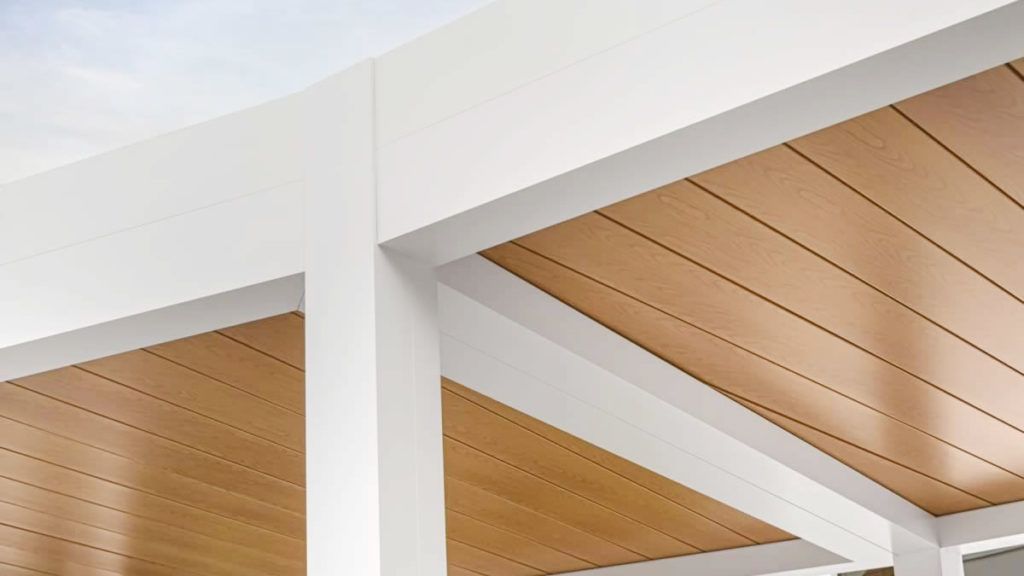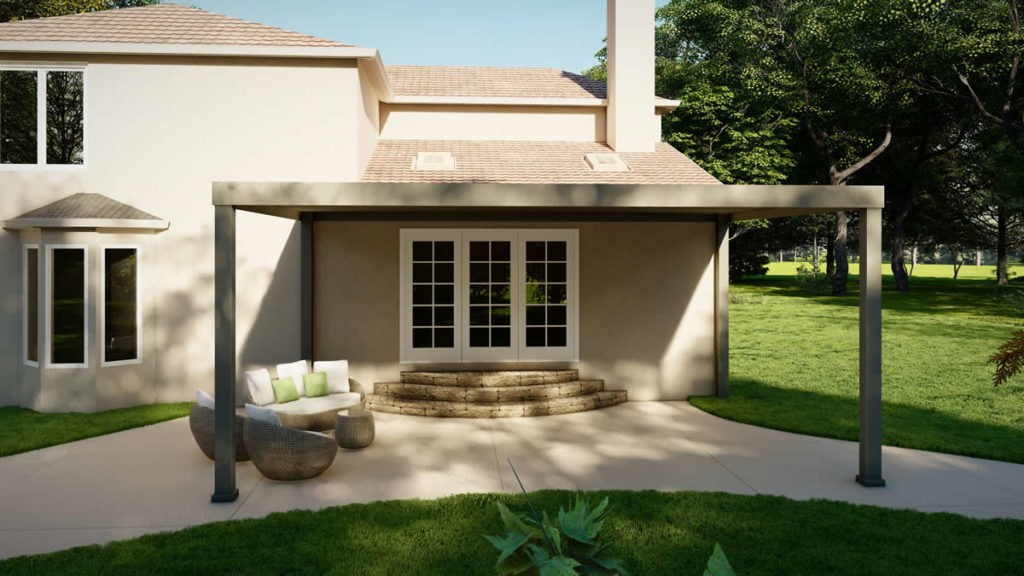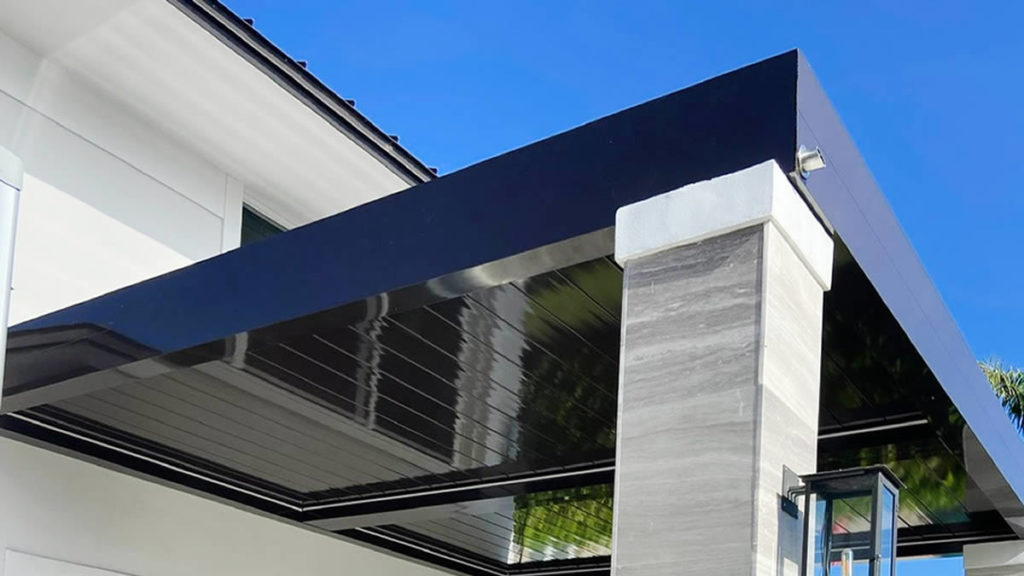Pergolas are fabricated from an array of materials including wood, vinyl and metal. There are advantages and disadvantages to each material.
- A wood pergola, for instance, requires extensive maintenance and consists of heavy material limiting where a larger pergola may be constructed.
- Vinyl pergolas are lightweight and reduce maintenance needs; however, they are less durable than a wood or metal pergola.
- Metal pergolas, on the other hand, are durable, lightweight, and minimize necessary maintenance. Let’s explore the unique advantages of a metal pergola.
What Metal Is Best for Pergolas?
The most prominent metals used in the fabrication of pergolas are steel and aluminum. Both are durable and strong metals. Aluminum is much lighter weight than steel, so it is the preferred fabrication material for today’s modern pergolas. Left untreated, both metals are susceptible to oxidation. Metal pergolas, then, usually receive a heavy-duty exterior coating to repel water. While some manufacturers rely on exterior paint, paint is prone to chipping over time, leaving exposed metal to rust.
Here at Azenco we build all of our outdoor living structures from high-quality aluminum and apply a high-quality powder coating for protection. We also customize powder coating to match any home’s exterior color scheme. We can even apply a wood grain to the roof of the structure for a wood feel.

What Are the Benefits of a Metal Pergola Frame?
The pergola frame is made up of support columns and the roof structure can be an adjustable louvered roof or made of insulated sandwich panels to create a fixed-roof pergola. A metal pergola frame is hollow to allow the space to be leveraged for numerous applications. In our pergola designs, we leverage this hidden space to house an integrated pergola gutter system that captures rainwater and channels it to downspouts at the base of the columns. This allows rainwater to be directed away from the patio, keeping the outdoor space dry during heavy rain showers.
What Differentiates a Metal Pergola Roof from Wood?
A wood pergola is limited in its functionality. The weight of a wooden pergola roof means it would be difficult to create adjustable lovers from the material, so wood pergolas are static structures. They can be designed with a solid shingled roof for full-time shade, or with static louvers to create some shade, but cannot block out sun and rain. On the other hand, fabricating the structure from lightweight aluminum allows the metal pergola with roof louvers to become adjustable. We incorporate whisper-quiet electric motors to open and close the louvers. This motorized control combined with precision manufacturing practices ensure that our louvered roof pergolas close tightly to create a gapless seal against rain or snow.
Why is a Metal Pergola Modern?
The greatest advantage of leveraging lightweight aluminum with a hollow frame design is we are able to integrate all kinds of comfort features into our custom designs. Our R-Blade adjustable louvered roof pergola can include a smart sensor array that monitors for rain, and that autonomously closes the roof at the first sign of showers. You can also add a wind sensor to monitor for high winds, and open the louvers to mitigate damage from powerful updrafts. A metal pergola can also hide other amenities in the frame, including motorized retractable privacy curtains or insect screens, LED lighting, infrared heaters, etc. Adding these types of accessories to a wooden pergola would leave wiring and receptacles exposed to view, but a metal pergola hides these components to maintain clean exterior lines.
What Projects Require a Metal Pergola Rather Than Wood?
Most pergola products, whether a standalone small metal pergola or a metal pergola attached to house, projects are built to create shade for a patio or pool deck and will have their footings buried in the ground. For these terrestrial projects, the overall weight of the structure does not make too much of a difference. A qualified engineer can design a wood or metal pergola to meet necessary structural regulations without worrying about the overall weight of the structure. But, for pergola projects on a deck, veranda, or roof deck, the overall weight of the structure becomes very important to the structural integrity of the deck, veranda, or roof. In these cases, a lightweight aluminum pergola is likely the only solution that will satisfy engineering and permitting codes.
How Long Does a Steel Pergola Last?
Steel on its own is a long-lasting material. A steel pergola will maintain true lines and hold its form indefinitely, though high-quality aluminum offers the same benefits without some of the drawbacks of steel. Steel is also apt to corrode in the elements, especially if it’s not properly coated to repel the elements. Additionally, the weight of a steel outdoor structure seriously restricts them to use on secure ground, where pooling water can be invasive as well. So, a steel pergola can last a lifetime, but the structure may require extensive maintenance and replacement parts, especially as the elements eventually cause it to rust.
What is Better, A Steel or Aluminum Pergola?
A steel pergola and an aluminum pergola will look very similar, but aluminum offers an array of advantages over a steel patio cover. As mentioned above, a properly coated aluminum pergola will last a lifetime if properly maintained. The maintenance demands for an aluminum pergola are minimal, essentially requiring an annual cleaning under a garden hose and a check of the gutter system to ensure there is no debris blocking the flow of rainwater. The hollow structure of an aluminum pergola also offers great flexibility in hiding away wiring for embedded lights, patio fans, etc. The greatest advantage of an aluminum pergola is its strong-yet-lightweight design. This strength-to-weight ratio means an aluminum pergola can be built on a deck or a roof where weight limitations would preclude construction of a steel patio cover.
Can You Have a Fire Pit Under a Metal Pergola?
Adding a fire pit under a pergola or wood-fired outdoor kitchen to your patio is a great way to entertain family and friends. While you certainly would not want to risk building a fire under a wooden pergola, fire pits are a welcome addition below a metal pergola. If a fire feature is part of your covered patio plans, it is highly recommended that you work with a qualified pergola contractor that can design your metal pergola to properly accommodate a fire pit or grill. Small gas fire pits or propane grills through far less heat, ash and cinders than a natural wood campfire, so they can often be easily added below a standard metal pergola. If you would prefer a natural wood fire, your contractor will recommend extending the pergola height slightly to allow more distance to the pergola roof. They will also likely recommend an adjustable louvered roof design which can be opened to vent smoke and ash from the fire pit.
Conclusion
A modern metal pergola is the ideal outdoor living structure and will bring a new level of enjoyment to a patio, deck, or roof deck. For homeowners and commercial property owners looking to create the most-advanced pergola with motorized functionality, embedded amenities, in a unique location, lightweight-but-strong aluminum is the material from which to choose.




6 Responses
Great post! I love how you broke down the pros and cons of both metal and wood pergolas. It’s definitely a tough choice, but your insights on maintenance and durability really helped me lean towards metal for my backyard project. Thanks for sharing!
Thank you! I’m glad you found the breakdown helpful. Choosing the right pergola material really makes a difference.
Great breakdown of the pros and cons! I’ve been debating between metal and wood for my outdoor space, and your insights on durability and maintenance really helped clarify things for me. I love the idea of a modern metal pergola, but I also appreciate the warmth of wood. This post gave me a lot to think about!
Thanks so much. I’m glad the post helped! A modern metal pergola with wood accents might give you the best of both worlds.
Great comparison! I love how you highlighted the durability of metal vs. the aesthetic appeal of wood. It really helped me weigh my options for my outdoor space. Thanks for the insights!
Thank you! We’re glad it was helpful!